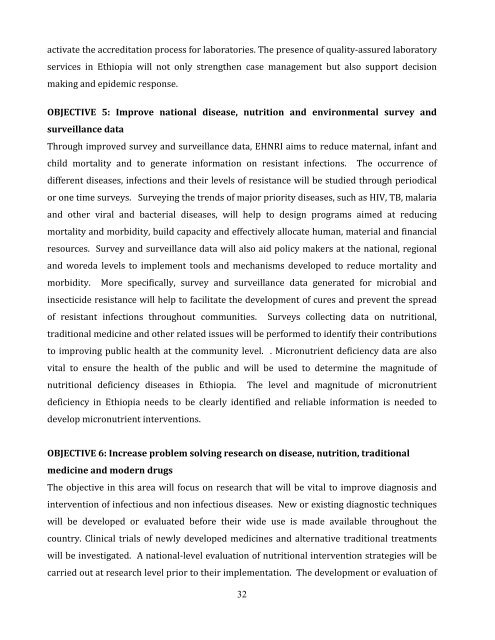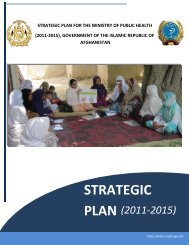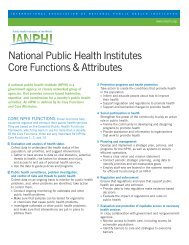ethiopian health and nutrition research institute - ianphi
ethiopian health and nutrition research institute - ianphi
ethiopian health and nutrition research institute - ianphi
- No tags were found...
You also want an ePaper? Increase the reach of your titles
YUMPU automatically turns print PDFs into web optimized ePapers that Google loves.
activate the accreditation process for laboratories. The presence of quality-assured laboratoryservices in Ethiopia will not only strengthen case management but also support decisionmaking <strong>and</strong> epidemic response.OBJECTIVE 5: Improve national disease, <strong>nutrition</strong> <strong>and</strong> environmental survey <strong>and</strong>surveillance dataThrough improved survey <strong>and</strong> surveillance data, EHNRI aims to reduce maternal, infant <strong>and</strong>child mortality <strong>and</strong> to generate information on resistant infections. The occurrence ofdifferent diseases, infections <strong>and</strong> their levels of resistance will be studied through periodicalor one time surveys. Surveying the trends of major priority diseases, such as HIV, TB, malaria<strong>and</strong> other viral <strong>and</strong> bacterial diseases, will help to design programs aimed at reducingmortality <strong>and</strong> morbidity, build capacity <strong>and</strong> effectively allocate human, material <strong>and</strong> financialresources. Survey <strong>and</strong> surveillance data will also aid policy makers at the national, regional<strong>and</strong> woreda levels to implement tools <strong>and</strong> mechanisms developed to reduce mortality <strong>and</strong>morbidity. More specifically, survey <strong>and</strong> surveillance data generated for microbial <strong>and</strong>insecticide resistance will help to facilitate the development of cures <strong>and</strong> prevent the spreadof resistant infections throughout communities. Surveys collecting data on <strong>nutrition</strong>al,traditional medicine <strong>and</strong> other related issues will be performed to identify their contributionsto improving public <strong>health</strong> at the community level. . Micronutrient deficiency data are alsovital to ensure the <strong>health</strong> of the public <strong>and</strong> will be used to determine the magnitude of<strong>nutrition</strong>al deficiency diseases in Ethiopia. The level <strong>and</strong> magnitude of micronutrientdeficiency in Ethiopia needs to be clearly identified <strong>and</strong> reliable information is needed todevelop micronutrient interventions.OBJECTIVE 6: Increase problem solving <strong>research</strong> on disease, <strong>nutrition</strong>, traditionalmedicine <strong>and</strong> modern drugsThe objective in this area will focus on <strong>research</strong> that will be vital to improve diagnosis <strong>and</strong>intervention of infectious <strong>and</strong> non infectious diseases. New or existing diagnostic techniqueswill be developed or evaluated before their wide use is made available throughout thecountry. Clinical trials of newly developed medicines <strong>and</strong> alternative traditional treatmentswill be investigated. A national-level evaluation of <strong>nutrition</strong>al intervention strategies will becarried out at <strong>research</strong> level prior to their implementation. The development or evaluation of32




